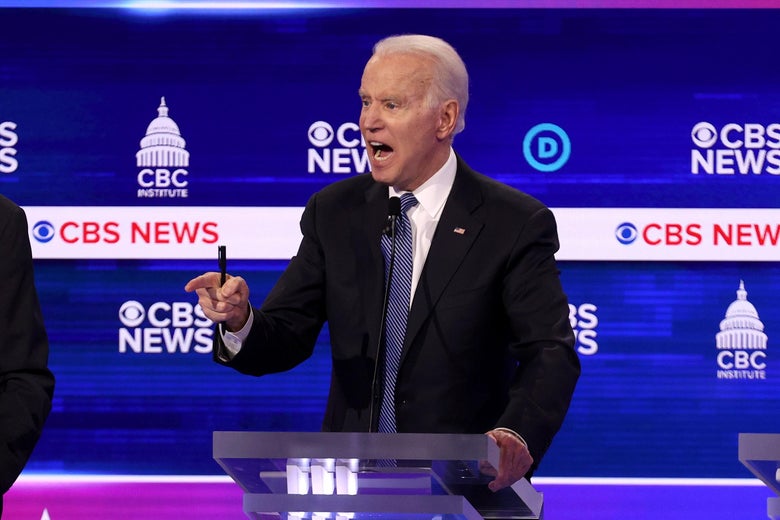
Democratic presidential candidate former Vice President Joe Biden speaks during the Democratic presidential primary debate at the Charleston Gaillard Center on February 25, 2020 in Charleston, South Carolina.
Win McNamee/Getty Images
In the final minutes of Tuesday’s Democratic presidential debate, Sen. Bernie Sanders mentioned former South African president Nelson Mandela. He was citing an inspirational quote from the dissident and statesman, but it also summoned the specter of the peculiar stories his rival Joe Biden has been telling about Mandela recently.
During an event in Columbia, South Carolina on Feb. 11, Biden offered a reminiscence about the depth of his personal history with Mandela. “This day, 30 years ago, Nelson Mandela walked out of prison and entered into discussions about apartheid,” Biden said. “I had the great honor of meeting him. I had the great honor of being arrested with our U.N. ambassador on the streets of Soweto trying to get to see him on [Robben] Island.”
He would mention his being arrested trying to see Mandela “twice more in the next seven days,” according to the New York Times. And in one mention, he offered a coda to the story: “After he got free and became president, he came to Washington and came to my office,” Biden said in Las Vegas on Feb. 16. “He threw his arms around me and said, ‘I want to say thank you.’ I said, ‘What are you thanking me for, Mr. President?’ He said: ‘You tried to see me. You got arrested trying to see me.’”
Both the Times and the Washington Post, in separate looks, have found no evidence to support this story, and no instances of Biden mentioning it until recently. The U.N. ambassador at the time, Andrew Young, has said that he was never arrested in South Africa, and he didn’t think Biden was, either.
The Biden campaign didn’t respond to a request for comment from the Post, which described each claimed incident as “not remotely credible”—the “streets of Soweto,” are hundreds of miles from Robben Island, which is an island—or to five requests for comment from the Times. In other words, for four days after the Times story first went up, neither Biden nor Biden’s campaign offered a word (on-the-record) about the South Carolina frontrunner’s fascinating, previously untold story for which there is no apparent supporting evidence.
It evoked a different piece of late 20th century history: the 1988 presidential campaign, when Biden’s bid for the nomination unraveled after he delivered passages from an autobiographical speech by the British Labour Party leader Neil Kinnock as if they were his own words. Then, Biden had talked about “my ancestors, who worked in the coal mines of Northeast Pennsylvania,” although his campaign was unable to come up with the names of any of his relatives who’d been coal miners.
In Tuesday’s post-debate spin room, an answer to the Mandela questions finally came. As Biden campaign staff and surrogates arrived there, the first question a reporter asked them was to clarify the story.
“He took a trip with a CODEL [congressional delegation] in the ’70s, he was separated from the CBC [Congressional Black Caucus] members that he was traveling with at the airport when he landed,” Biden’s deputy campaign manager and communications director, Kate Bedingfield, told the reporter. “When making that remark, he was talking about his long record of fighting apartheid.”
So he wasn’t arrested?
“He was separated from the group he was with at the airport,” she said.
This explanation at least aligns with something that Biden has referenced in the past. In a statement his office released when Mandela died in 2013, he mentioned a trip he made as a 34-year-old senator, in the 1970s.
“When I exited the plane I was directed to one side of the tarmac, while the African American congressmen traveling with me were sent to the other side,” the statement read. “I refused to break off, and the officials finally relented.”
So he was not arrested “on the streets of Soweto” with the U.N. ambassador during an effort to see Nelson Mandela in prison. He was, however, briefly separated from his African-American colleagues by the apartheid regime on the tarmac. There’s a wide gulf between those stories, and we know that (at least) one of them—the one he’s told most recently, while campaigning for president—is flatly untrue.
Readers like you make our work possible. Help us continue to provide the reporting, commentary and criticism you won’t find anywhere else.
Join Slate Plusfrom Slate Magazine https://ift.tt/2T2glam
via IFTTT
沒有留言:
張貼留言